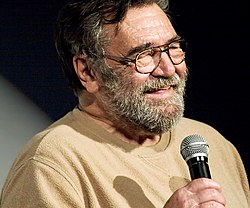| Spicy City | |
|---|---|
 Raven in Spicy City | |
| Genre | |
| Created by | Ralph Bakshi |
| Written by | Various |
| Directed by | Various |
| Voices of | Michelle Phillips |
| Composer | John McCarthy |
| Country of origin | United States |
| Original language | English |
| No. of seasons | 1 |
| No. of episodes | 6 |
| Production | |
| Executive producer | Ralph Bakshi |
| Producer | Catherine Winder |
| Running time | 25 minutes |
| Production companies | |
| Original release | |
| Network | HBO |
| Release | July 11 – August 22, 1997 |
Spicy City is an American adult animated erotic cyberpunk television series which was created by Ralph Bakshi for HBO. The first of two adult animated series to air on HBO in the same year, [1] [a] the show serves as an anthology series in a similar format as television programs such as The Twilight Zone and Tales from the Crypt . The series premiered on July 11, 1997, and ended on August 22, with a total of 6 episodes over the course of 1 season. [2]
